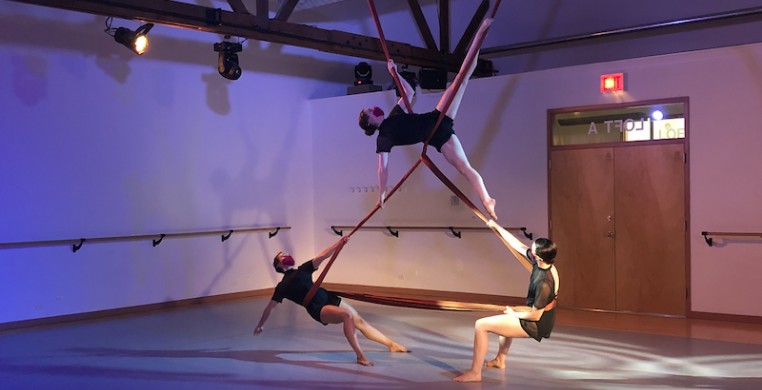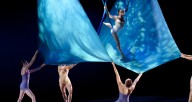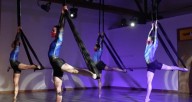A week before their annual fundraiser and scheduled 20th anniversary concert, Aerial Dance Chicago (ADC), like the rest of the world, shut down due to the coronavirus pandemic. While those events were cancelled, ADC jumped back into the studio sooner than most and became a leader in safety protocols for the Chicago dance community. With some ups and downs over the past year, they took the time to explore new ideas which will be featured in their upcoming performances of “Searchlight.” The concert includes five premieres which, in part, are inspired by the “experience of being alive.”
Three members of ADC’s artistic team have strong ties to the medical community. Founder and artistic director Chloe Jensen’s mother was a long-time Chicago Public Health researcher. Co-founder and production director Kip Conwell is the Biology Lab manager at Northeastern Illinois University specializing in virology and epidemiology. And dancer/choreographer Karen Fisher Doyle is a nurse at Rush University Medical Center who worked on Chicago’s first all-COVID unit. Using their combined expertise and firsthand experiences, the team drafted strict protocols to get back to rehearsing in record time.
“I knew it was coming,” Doyle said in a joint interview with Conwell and Jensen, who are married. “We were nervous. Rush is a pandemic center, so we knew as the virus hit the United States that we were going to be the center for Chicago. We were getting updates constantly.”
Jensen remembers Conwell talking about COVID as early as January. “I felt confident in my knowledge of the way the pandemic was heading – not in a good way,” said Conwell. “And Karen was already in the thick of it. We could see the deep impressions on her face from her masks.” By March, all 32 labs at Northeastern had been shut down. Finding safe ways to reopen them became a priority. “The protocols we developed at the university matched pretty well with what we needed to do at the studio, so it was a moment of synergy,” he said.
Along with what are now “standard” protocols like masking, distancing and sanitizing, as an aerial dance company, ADC had a few other challenges. “There were no shared props, no shared equipment and 95% of what we do is on an aerial apparatus,” Jensen said. “That was a huge, daunting task. There were a few weeks when I thought it was impossible to reopen, but we managed to get through it. I had Kip’s expertise and Karen’s firsthand experience to rely on.”
One positive of aerial work is that the rigging systems were already set at nine feet apart, clearly over the set six-foot distancing mandate. The other asset was the seriousness and dedication to safety of Jensen and Conwell. Soon ADC’s reopening plan became an example for other companies to open.
“We communicated a lot,” said Conwell. “We wanted everything in writing and available. We wanted clear expectations. We didn’t want to be a hot spot or take any risks.” A visit from Chicago’s Business Affairs and Consumer Protection department confirmed their plan was safe. “I think they made us move the hand sanitizer, but that was it,” he said. “They were totally satisfied.”
Confirmation of the new studio safety protocols came as a relief to Doyle. After two months in close proximity with COVID patients at the hospital, she was filled with many emotions about returning to the studio.
“Reopening was exciting and a little scary,” she said. “At work I was covered from head-to-toe in PPE, but I’m really close to the patients and getting coughed on. I even had blood splattered on my goggles. I was my own hot spot. I had to stay distanced from my family. This past year has been the most challenging in my 28 years of nursing. But I thought, ‘This is what I am. I’m a nurse and I will face this pandemic.’ Luckily, I never got COVID, but knowing that Kip and Chloe had all these protocols in place made me feel safe. It was comforting to me to be able come into the studio and be physical and express myself. It was a blessing to create art. It was a very confusing time. People were calling us (nurses) heroes, but no one wanted to be near us. I was very grateful to know that ADC was including me.”
The pandemic also presented opportunities to find new ways to create. Once safely back in the studio, Jensen started playing with a curved board and thinking of ways to perform without touching. “We’ve been creating very different things,” Jensen said. “Karen and I co-created a piece using a silk connected at the bottom, like a box. We explored the air-ground continuum, where the air meets the ground, in a new way.” Conwell adds, “They can pull each other and spin each other, they can partner each other without touching.”
Now, as we find ourselves (hopefully) emerging on the other side of the pandemic, there are some take-aways from ADC’s shared experiences. Just being able to be in the sunny studio with your fellow dancers can make all the difference. “You lose your physicality so quickly. It took me about eight weeks to feel like I could perform,” said Doyle. You have to have patience with yourself and take the time to persevere. It’s amazing what the human body can do.”
As a director and teacher at ADC’s school, Jensen noticed the pandemic really affected people’s posture. “One of the most inspiring things for me, being in the studio again, was watching people open up, their light and energy and strength coming back into their bodies,” she said. Conwell agrees, “It really was a beautiful thing to see.”
--
Aerial Dance Chicago presents “Searchlight” in two performances on Friday and Saturday. Tickets are available for in-person ($25) at 4028 W. Irving Park Rd. or online as a livestream ($10). To purchase tickets, visit www.aerialdancechicago.org/events-and-tickets/searchlight or click the event link below. View a trailer here.



